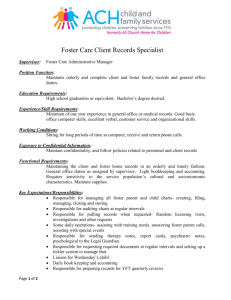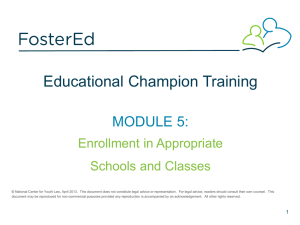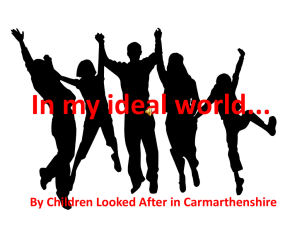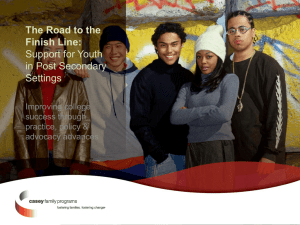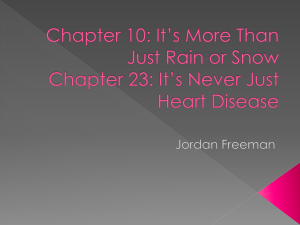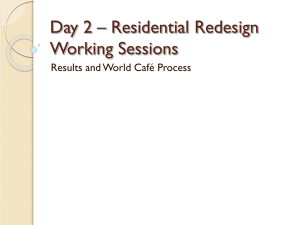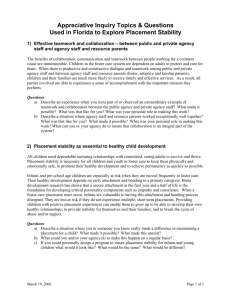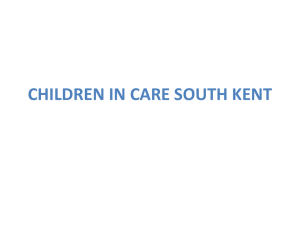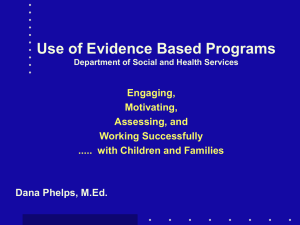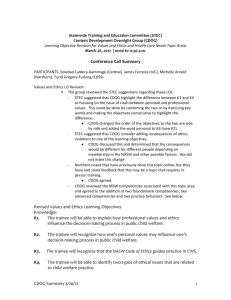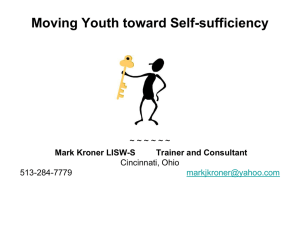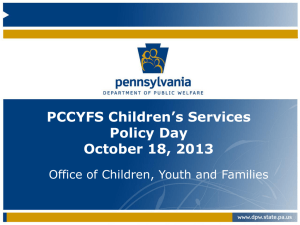PP Presentation
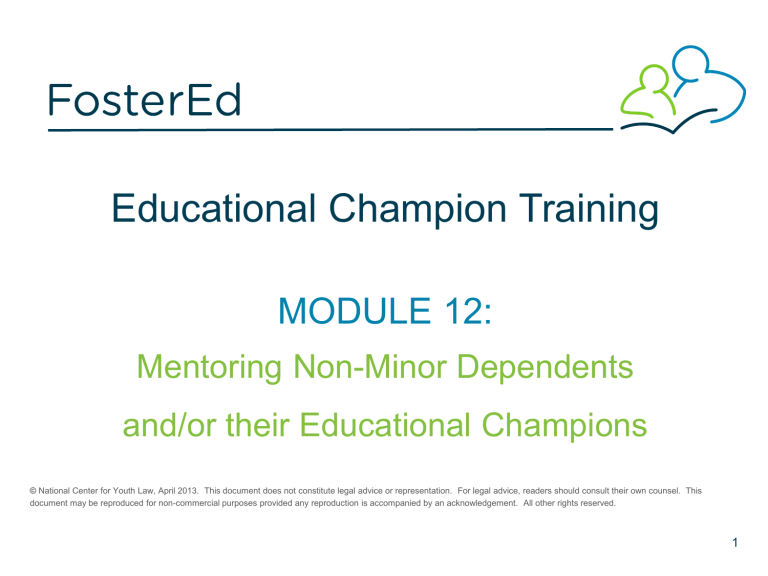
Educational Champion Training
MODULE 12:
Mentoring Non-Minor Dependents and/or their Educational Champions
©
National Center for Youth Law, April 2013. This document does not constitute legal advice or representation. For legal advice, readers should consult their own counsel. This document may be reproduced for non-commercial purposes provided any reproduction is accompanied by an acknowledgement. All other rights reserved.
1
Why Focus on Non-Minor Dependents?
Many former foster youth experience negative outcomes after they leave foster care.
Former foster youth are more likely to:
be unemployed,
be underemployed,
missed opportunities for post-secondary education,
experience poverty and low wages,
struggle with unplanned pregnancies & parenting children, and
experience the adult criminal system.
APRIL 2013 2
Are there any laws to help former foster youth?
To address and prevent these poor outcomes, the California Fostering
Connections to Success Act (called AB 12) was passed.
AB 12 allows young adults to remain in care after they turn 18 years old so that they can:
Prepare for their futures with additional educational and employment training opportunities,
Find and secure stable and safe housing , and
Build permanent connections with caring adults (including relatives, mentors, and community members).
Each additional year a youth is in care beyond their 18th b-day helps increase earning potential .
APRIL 2013 3
What is a non-minor dependent?
For purposes of AB 12, youth who opt to remain in care passed their 18th birthday are called “non-minor dependents.”
It is up to the youth whether s/he wants to participate in
AB 12.
APRIL 2013 4
An introduction to AB 12.
The goals of extending foster care are based on the needs of the individual, but they aim to help the youth:
Develop permanent connections with caring and committed adults,
Develop independent living skills and have opportunities for incremental responsibility,
Pursue education and/or employment goals, and
Live in the least restrictive placement.
APRIL 2013 5
The basic requirements of AB 12.
In order to receive the relevant services and supports after the age of
18, the youth must meet ONE of the following participation requirements :
Be completing high school or equivalent program (i.e. GED); OR
Be enrolled in college, community college, or a vocational education program; OR
Be employed at least 80 hours a month; OR
Be participating in a program designed to remove barriers to employment; OR
Be unable to satisfy one of the above requirements because of a medical condition.
APRIL 2013 6
Home placements under AB 12.
The home placements available to youth participating in AB 12 are very flexible .
A home placement could be:
Home of a relative or non-relative extended family member (NREFM),
Foster family,
Foster Family Agency-certified home,
Home of a non ‐ related legal guardian,
Group home,
THP ‐ Plus Foster Care, or
Supervised Independent Living setting (SILP).
There are specific rules for approving a home placement.
APRIL 2013 7
Mentoring a non-minor dependent.
Let the youth know that you are there to continue supporting his/ her educational success.
Tell the youth that you care about his or her well-being and stability.
Tell the youth that you want to make sure he or she has everything needed for successful independence
– including a great education.
Ask the youth to share his or her own thoughts about ways you can continue to provide support and guidance .
Offer to participate in the youth’s transition planning process.
APRIL 2013 8
If the youth is in the process of completing high school or a GED program . . .
Continue to take an active interest in the youth’s education and career goals.
Offer to help the youth start thinking about next steps, like college or career training.
Provide the youth with guidance throughout the college application process.
Offer to help the youth pursue summer enrichment or summer job opportunities.
APRIL 2013 9
If the youth is enrolled in college or in a career training program . . .
Continue to take an active interest in the youth’s education and career goals.
Have regular conversations about how the college courses or career training are going.
Offer to help the youth explore possible courses of study and choices of majors/minors.
Encourage the youth to pursue his/ her career goals.
Continue to praise the youth for his or her hard work and accomplishments.
APRIL 2013 10
If the youth is working . . .
Have regular conversations with the youth about how his/ her job is going.
Talk to the youth about short-term and long-term career goals (promotions, job changes, etc.)
Help the youth map out what steps s/he will need to take to reach those goals.
APRIL 2013 11
If the youth is looking for work . . .
Ask the youth about what type of work s/he is looking for.
Offer to help the youth brainstorm about possible job opportunities.
Offer to provide the youth with guidance and support during the job search process.
APRIL 2013 12
Ways to help with the job search.
You can provide the youth with support through their job search by:
Helping the youth look for job listings online.
Helping the youth prepare a resume & reference list.
Offer to connect the youth with an adult who works in the youth’s field of interest.
Helping the youth prepare for a job interview (i.e. mock interview).
APRIL 2013 13
My Goals:
What I will do:
__________________
__________________
__________________
__________________
__________________
__________________
APRIL 2013
How often I will do this:
___________________
___________________
___________________
___________________
___________________
___________________
14
Resources.
This PowerPoint, Tip Sheets, Mentoring Modules, and supporting materials can be found at: www.foster-ed.org
.
If you have questions about the materials, please contact: info@fostered.org
Other Resources:
After 18 Your Future Your Choice, available at www.after18ca.org
Assembly Bill 12 Primer, developed by the Alliance for Children’s
Rights, John Burton Foundation, and Children’s Law Center
APRIL 2013 15
